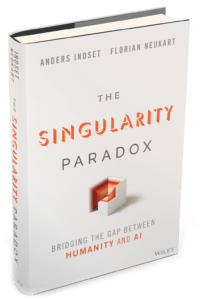AI has killed me!
AI has killed me!
For years, I have danced with em-dashes (—) and guillemets (« »).
When I wrote ‘Infected Thinking’, my publisher frowned: “Are you certain about this punctuation?” Yes, I was. The style was not the soul, but the thought behind it—my flow, distilled in these marks.
Then came November 30, 2022, the GPT moment.
The AI learned, grew better, and adopted its tone—that tone I had fought for over years. From the vitality and language of a small human, I became a Homo Obsoletus of almighty technology—AI replaced by compressed AI. (My) drop in the ocean of training data—irrelevant—yet enough to compress my Lebendigkeit— the vitality of life itself. What was once a wild stream became a precise, mechanical echo.
Will my thinking be taken from me?
This very loss is the greatest threat of the looming technological tsunami. It is not the utopias of possibility or the dystopias of downfall that should preoccupy us, but the dance of mind and matter. In a future of artificial general intelligence, super intelligence, and the pursuit of singularity, it is neither about right or wrong, nor good or evil, but about our vitality—the Lebendigkeit.
My voice is not lost. I still shape the flow between the lines, lending drama and character through an em-dash, a guillemet. Yet the machine dances along—precise, tireless, a mirror that both reflects and distorts me. In this digital age, we do not fight for life or death, but for the question of how alive our life still is—for that perception shaped by an em-dash or an individually placed guillemet. If this perception fades in a binary world, our light remains on, but noone there to percieve them. Then they will arrive: the philosophical zombies—all-knowing, immortal, yet too dead to be alive and too alive to be dead. A captivity in a new existential undeadness.
I see them daily in people: eyes that could shine but only stare. Those are the reactive ones, that still technologically has the potentiality.
So I write these lines, knowing an AI will grasp them instantly. It needs to read this last sentence just once. You, the reader? Perhaps two or three times. This is the challenge I face each day as I strive to understand the world anew. The search for the future of Mensch—what it means to be human—is the extension of organized human life:
« As long as there are beings who can ask questions and perceive progress in answers, there is hope. Humanity—and its vitality—lives in one final question. »

Singularity Paradox – Bridging The Gap Between Humanity and AI
New Book Out Now: https://singularityparadox.com/
